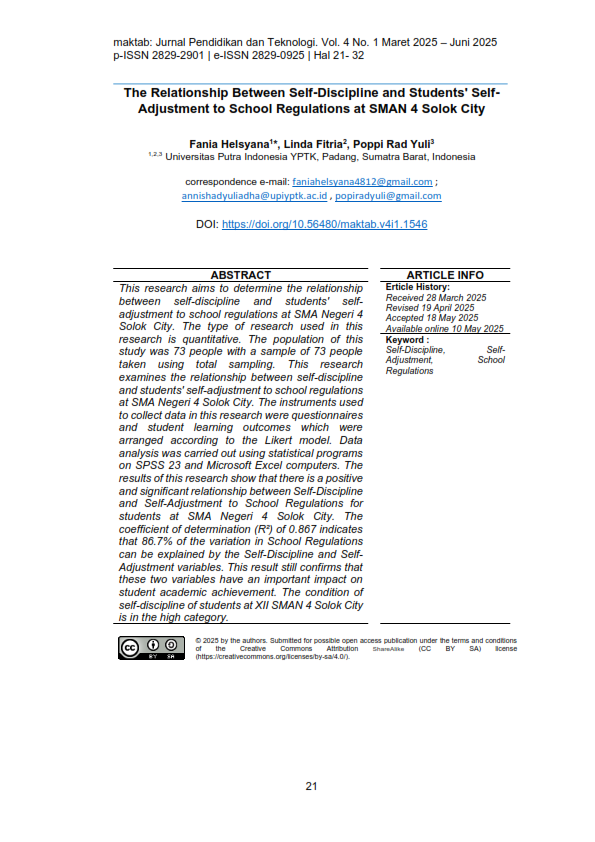The Relationship Between Self-Discipline and Students' Self-Adjustment to School Regulations at SMAN 4 Solok City
DOI:
https://doi.org/10.56480/maktab.v4i1.1546
 Abstract View:
Abstract View:
23
 PDF downloads:
PDF downloads:
17
Keywords:
Self-Discipline, Self-Adjustment, School RegulationsAbstract
This research aims to determine the relationship between self-discipline and students' self-adjustment to school regulations at SMA Negeri 4 Solok City. The type of research used in this research is quantitative. The population of this study was 73 people with a sample of 73 people taken using total sampling. This research examines the relationship between self-discipline and students' self-adjustment to school regulations at SMA Negeri 4 Solok City. The instruments used to collect data in this research were questionnaires and student learning outcomes which were arranged according to the Likert model. Data analysis was carried out using statistical programs on SPSS 23 and Microsoft Excel computers. The results of this research show that there is a positive and significant relationship between Self-Discipline and Self-Adjustment to School Regulations for students at SMA Negeri 4 Solok City. The coefficient of determination (R²) of 0.867 indicates that 86.7% of the variation in School Regulations can be explained by the Self-Discipline and Self-Adjustment variables. This result still confirms that these two variables have an important impact on student academic achievement. The condition of self-discipline of students at XII SMAN 4 Solok City is in the high category.
References
Achmad, G. H., Ratnasari, D., Amin, A., & Yuliani, E. (2022). Penilaian autentik pada kurikulum merdeka belajar dalam pembelajaran pendidikan agama Islam di sekolah dasar. Edukatif: Jurnal Ilmu Pendidikan, 4(4), 5685–5699. https://doi.org/10.31004/edukatif.v4i4.3280
Afiah, N. (2022). Analisis relasi pertemanan melalui perilaku asertif pada mahasiswa IAIN Parepare. Indonesian Journal of Islamic Counseling, 4(2), 1–15. https://ejurnal.iainpare.ac.id/index.php/ijic
Afrizawati, Anggraini, R., & Nurhasanah. (2021). Hubungan konsep diri dan penyesuaian sosial dengan self-regulated learning di era pandemi COVID-19. *Jurnal As-Said, 1*(2), 13–24.
Agustiani, H. (2017). Psikologi perkembangan: Pendekatan ekologi kaitannya dengan konsep diri dan penyesuaian diri remaja. Adhitama.
Afdhalia. (2021). Penyesuaian akademik ditinjau dari kesesuaian minat memilih jurusan dan dukungan sosial orang tua [Undergraduate thesis, UIN Raden Intan Lampung].
Arikunto, S. (2002). Prosedur penelitian: Suatu pendekatan praktek (Rev. ed.). Rineka Cipta.
Damanik, R. (2020). Faktor-faktor yang mempengaruhi motivasi berprestasi mahasiswa. Jurnal Serunai Administrasi Pendidikan, 15(1), 45–60. https://doi.org/10.37755/jsap.v9i1.252
Fachrurozi, F. M. (2020). Pengaruh model problem based learning (PBL) terhadap hasil belajar di SDN Sindangpanon Kec. Banjaran [Undergraduate thesis, FKIP Universitas Pasundan].
Fitria, L. (2016). Hubungan antara pengasuhan orangtua dengan penyesuaian diri siswa terhadap peraturan sekolah. Jurnal Bimbingan dan Konseling UPI YPTK Padang, 2(1), 12–25. https://doi.org/10.33373/kop.v2i2.304
Ghozali, I. (2019). Aplikasi analisis multivariate dengan program SPSS (8th ed.). Universitas Diponegoro.
Gunarsa, S. D. (2004). Psikologi praktis anak, remaja, dan keluarga (7th ed.). PT Gunung Mulia.
Hasibuan, J. J., & Moedjiono. (2012). Proses belajar mengajar. Remaja Rosdakarya.
Hurlock, E. B. (2013). Perkembangan anak (11th ed.). Erlangga.
Ismail, F. (2018). Statistika untuk penelitian pendidikan ilmu-ilmu sosial. Kencana.
Kusumadewi, S., Hardjajani, T., & Priyatama, A. N. (2012). Hubungan antara dukungan sosial peer group dan kontrol diri dengan kepatuhan terhadap peraturan pada remaja putri di Pondok Pesantren Modern Islam Assalam Sukoharjo. Jurnal Ilmiah Psikologi Candrajiwa, 1(2), 45–60.
Latif, A. (2009). Pendidikan berbasis nilai kemanusiaan. Refika Aditama.
Rusyan, T. (2014). Pendekatan dalam proses belajar mengajar. Remaja Karya.
Septiana, A. R., & Saputra, S. P. (2019). Hubungan antara konsep diri terhadap kedisiplinan siswa di sekolah kelas IX SMP Negeri 2 Padaherang Pangandaran [Undergraduate thesis, Universitas Ahmad Dahlan].
Sugiyono. (2020). Metode penelitian kuantitatif, kualitatif, dan R&D (2nd ed.). Alfabeta.
Supardi. (2017). Pengaruh adversity quotient terhadap prestasi belajar matematika. Jurnal Formatif, 3(1), 61–71. http://portal.kopertis3.or.id/bitstream/123456789/1599/1/Supardi%20formatif.pdf
Syawaluddin, A. H. F. (2023). Pengaruh tata tertib sekolah terhadap kedisiplinan siswa kelas VIII di SMP Negeri 1 Kota Solok. YASIN: Jurnal Pendidikan dan Sosial Budaya, 3(1), 97–105. https://doi.org/10.58578/yasin.v3i1.847
Triatna, C., & Kusmana, A. (2006). Visionary leadership menuju sekolah efektif. Bumi Aksara.
Tu’u, T. (2004). Peran disiplin pada perilaku dan prestasi siswa. Grasindo.
Walgito, B. (2004). Bimbingan dan konseling perkawinan. Andi.
Widodo, E. (2016). Manajemen pengembangan sumber daya manusia. Pustaka Pelajar.
Wulandari, F. (2014). Penerapan tata tertib sekolah sebagai salah satu upaya pembinaan karakter disiplin siswa di SMK Sumpah Pemuda Joglo Jakarta Barat [Undergraduate thesis, UIN Syarif Hidayatullah Jakarta].

Downloads
Published
How to Cite
Issue
Section
License
Copyright (c) 2025 Fania Helsyana, Linda Fitria, Poppi Rad Yuli

This work is licensed under a Creative Commons Attribution-ShareAlike 4.0 International License.





















